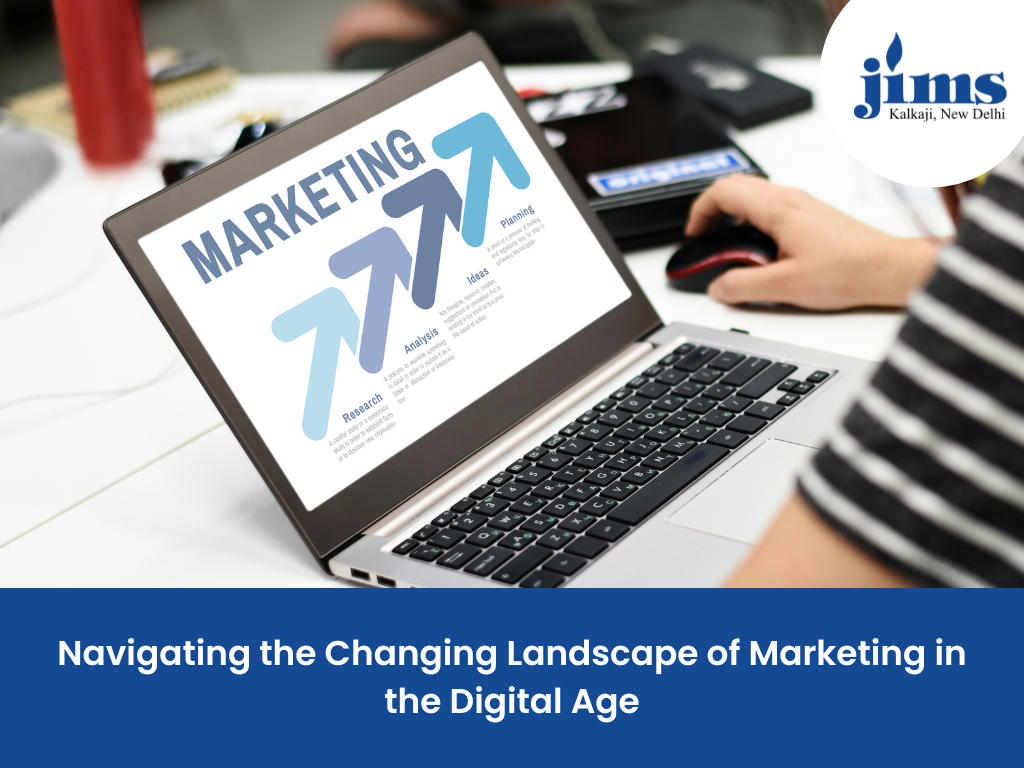The digital age has revolutionized the marketing landscape, necessitating a shift in strategies and approaches. We at JIMS, Kalkaji, one of the best b school in Delhi believes that today, businesses must adapt to the ever-changing digital landscape to effectively reach and engage with their target audience. This article explores the evolving marketing landscape in the digital age and provides insights into strategies for success.
-
The Digital Transformation of Marketing
The advent of digital platforms and technologies has fundamentally transformed the marketing landscape. Traditional marketing techniques have been complemented, and in some cases replaced, by digital marketing strategies. Businesses now have a wide range of tools and channels at their disposal to connect with customers, measure their impact, and adjust their marketing efforts in real-time.
-
Harnessing Digital Channels and Technologies
To navigate the changing marketing landscape, businesses must embrace the following strategies:
-
Content Marketing:
Creating high-quality and relevant content has become essential in capturing the attention of digital consumers. Businesses can leverage content marketing to educate, entertain, and engage their target audience, building trust and loyalty.
-
Search Engine Optimization (SEO):
With search engines serving as the primary source of information for many consumers, optimizing online content to rank higher in search engine results is crucial. SEO techniques help businesses increase their visibility and organic traffic, leading to greater brand exposure and customer acquisition.
-
Social Media Engagement:
Social media platforms have become integral to marketing strategies, providing a means to connect with audiences on a personal level. Businesses can leverage social media to share content, engage in conversations, build communities, and cultivate brand advocates.
-
Influencer Marketing:
Collaborating with influencers who have a significant following and influence over a target audience can amplify a brand’s reach and credibility. Influencer marketing allows businesses to leverage the trust and loyalty established by influencers, expanding their brand awareness and driving conversions.
-
Data-Driven Decision-Making:
Data analytics plays a crucial role in optimizing marketing strategies. By collecting and analyzing data, businesses can gain insights into customer behavior, preferences, and market trends. These insights enable data-driven decision-making, allowing businesses to refine their marketing efforts for better results.
-
Adapting to Changing Consumer Behaviour
Consumer behaviour has evolved significantly in the digital age, and businesses must adapt their marketing strategies accordingly:
-
Mobile Optimization:
With the widespread use of smartphones, businesses need to ensure that their websites and content are mobile-friendly. Optimizing for mobile devices enhances the user experience, increases engagement, and improves conversion rates.
-
Personalization:
Consumers expect personalized experiences and communications from brands. Businesses can leverage data to tailor their marketing efforts, delivering personalized recommendations, offers, and messages that resonate with individual customers.
-
User-Generated Content:
User-generated content, such as reviews, testimonials, and social media posts, has a significant impact on consumers’ purchasing decisions. Encouraging and leveraging user-generated content can build trust, authenticity, and social proof for a brand.
-
Customer Journey Mapping:
Understanding the customer journey is crucial for effective marketing. By mapping out the different touchpoints and interactions customers have with a brand, businesses can identify opportunities to optimize and personalize the customer experience.
-
Embracing Innovation and Agility
To thrive in the digital age, businesses must embrace innovation and agility in their marketing strategies:
-
Embracing Emerging Technologies:
Staying updated with emerging technologies, such as artificial intelligence, virtual reality, and chatbots, allows businesses to leverage new channels and experiences to engage with customers. Adopting innovative technologies can give businesses a competitive edge and enhance the customer experience.
-
Agile Marketing:
The digital landscape is dynamic, requiring businesses to be flexible and adaptable. Agile marketing methodologies enable businesses to
quickly respond to market changes, experiment with new approaches, and iterate their strategies based on real-time feedback.
-
Continuous Learning and Adaptation:
Digital marketing is a rapidly evolving field. Businesses must foster a culture of continuous learning, encouraging marketers to stay updated with industry trends, attend conferences, participate in webinars, and engage in professional development activities.
Conclusion
The digital age has revolutionized the marketing landscape, presenting businesses with new challenges and opportunities. To navigate this changing landscape successfully, businesses must embrace digital marketing strategies, harness the power of digital channels and technologies, adapt to changing consumer behaviour, and embrace innovation and agility. We at JIMS, Kalkaji being one of the top management college in Delhi believes that by implementing these strategies, businesses can effectively reach and engage with their target audience, enhance brand visibility, and drive business growth in the dynamic digital age.

